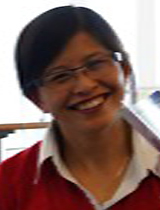A Personal Story of a Cultural Broker (MA UCEDD/LEND)
March 13, 2017

|
This is the conclusion of our series about cultural brokering in the Vietnamese community. Read Part 1 here. [link to Part 1] Read Part 2 here. [link to Part 2]
Part 3:
Catalyzing change
In addition to providing direct support to families, I have been a guest speaker at Lesley University, Boston University, and UMass Boston. In my talks there, I've educated both undergraduate and graduate students about Vietnamese cultural values, perceptions about disability, and communication style.
In this way, I hope that these students will become more culturally responsive to families they serve in the future.
I also collaborate with researchers to document culturally and linguistically diverse parents' experiences with their children's IEP process, healthcare access, and insurance access, either through focus groups or in-person interviews.
As a result of language barriers, many parents don't learn about support systems. My colleagues at the Federation for Children with Special Needs and I are addressing some of these language access issues.
For example, although some translated documents are available on state disability websites, they are often not understandable due to the poor quality of translation. Providing better translations makes these documents more accessible and useful to families.
Brokering change across communities
Many other culturally, linguistically diverse families face similar issues. I've collaborated with the Haitian-American Public Health Initiatives (HAPHI) to offer trainings, empowering Haitian-Creole-speaking parent leaders to become cultural brokers for their own community. I am also collaborating with Arabic-speaking parents of children with disability who want to establish a cultural support network.
To increase equity and access while respecting the unique cultural values of families from diverse communities, service providers must reach out to and reciprocally engage parents. By building mutual relationships and offering appropriate materials, cultural brokering groups like mine can empower parents and ensure service provision is culturally and linguistically appropriate.
This year, I am fortunate to be an AIDD-funded diversity leadership fellow with the Institute for Community Inclusion (ICI) at UMass Boston. My work here has entailed interviewing leaders in the disability field to learn about their career growth in this area. Secondly, we are developing and will be conducting a cultural brokering curriculum to empower parents and families.
I hope to continue to be a champion for authentic diversity inclusion.







